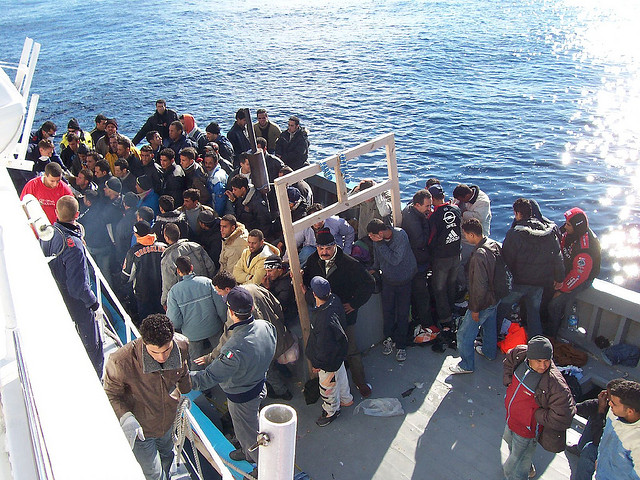On Wednesday, the European Commission is set to launch a new migration plan to directly deal with the Mediterranean migrant boat crisis. Most leftists were quick to label it as a radical step in the right direction while the usual neocon personas represented by Britain’s David Cameron and Hungary’s Viktor Orban were quick to resist it.
Led by Germany, the proposed plan aims to establish a quota system for refugee sharing across the 28 EU member states. The idea behind the plan is to equally portion some responsibility in terms of resettling asylum seekers. It is no secret that most refugees end up at the shores of Europe’s most economically depressed nations, such as Greece and Italy or on the small Mediterranean island of Malta, mainly due to the geographical position of these states.
Yet these countries lack the necessarily means for assisting refugees’ later resettlement and for dealing with the increased migrant smuggling rates. For instance, in the currently indebted Greece, the unemployment rate hits 25 per cent (with many excluded from such counts) while those lucky enough to be working are scrapping by with less than three euros per hour. It is mainly why many asylum seekers are making their ways towards the wealthier nations of Germany, Sweden and Austria and are later absorbed by these wealthier nations.
Germany and Sweden are currently taking half of the asylum seekers in the EU, yet this is not equally reciprocated by the wealthy nations of Britain or France. Last year alone, Germany processed close to 200,000 asylum seekers while the U.K. numbers were about six times lower. The proposed quota system will definitely balance out such discrepant numbers and create a fairer resettlement system.
But how equally across the 28 EU states does this system ground itself? In seeking fairness as an outcome, the EU should also address the criteria for establishing such fairness. Current distributive principles for the quota system mainly include national wealth level (as measured by GDP), unemployment rates and the size of the country. Looking at the economics is important, yet inequality within EU goes beyond simple economics.
While the overall gap measurements will take into consideration the unequal economic position that many EU member states are occupying within the Union, it ignores the unequal political position in terms of inclusion or exclusion in the privileged free travel Schengen area, or the current migration flows within the EU. Schengen was established as a space with no internal border controls under an all matching visa system. Not all EU member states are part of the Schengen system. While Bulgaria, Croatia, Cyprus and Romania are kept out due to claims of unpreparedness in terms of “border controls,” other countries like Ireland and the United Kingdom have negotiated Schengen opt-outs in order to tighten border controls against irregular entries. Schengen membership/no membership and the way such membership was established should nonetheless constitute an added criterion when looking at a border related manner from the framework of a non-boarded space.
Next, in terms of migration flows, EU cannot ignore the high east-to-west migration numbers coming from the 2007 A2 new member states and Europe’s poorest nations, Bulgaria and Romania. For instance, since 2007, U.K. has been granting national insurance numbers on a yearly basis to an average of 22,000 Romanians and 14,000 Bulgarians — and this is when migration curbs were restricting the flow of workers from these countries (transitional provisions have been lastly lifted in 2014).
Although these A2 states have a somewhat significant size, with a minimum wage of 184 euros a month for Bulgaria and 218 euros a month for Romania, it is difficult to imagine how they could accommodate refugee resettlement, particularly when their own people are migrating due to lack of economic opportunities.
This is not to say that the new member states should not participate in the common European efforts of finding a solution to the migrant crisis. Yet the criteria of which countries should bear more weight in finding the solution should consequentially reflect the inequalities that currently exist between the EU member states. Brussels should additionally include minimum wage considerations as well as assessments of internal migration flows within the Union.
Raluca Bejan is a doctoral student at University of Toronto where she studies immigration.
Image: Flickr/Vito Manzari




